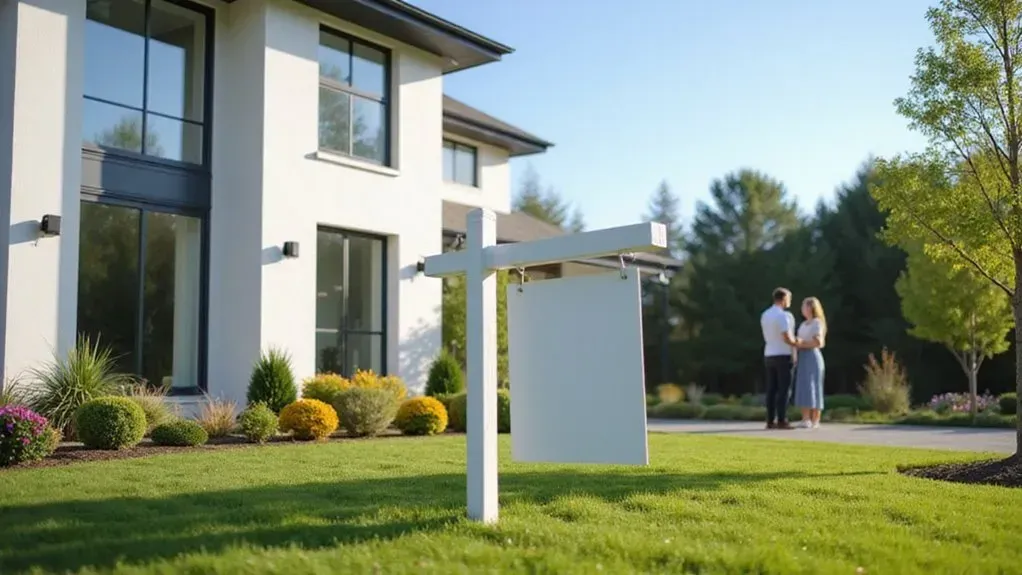
Caught between legal deadlines and the emotional turmoil of divorce, many homeowners feel trapped when selling their marital property. The pressure to meet court-mandated timelines adds stress to an already difficult situation. Making hasty decisions about such a significant asset can lead to financial regret. Understanding your legal options and timeframe requirements provides a clear path forward during this challenging transition.
The timeframe to sell a house after divorce typically ranges from 30 days to one year. This period is determined by specific court orders, your divorce decree terms, and individual circumstances like financial obligations or custody arrangements.
In this blog I will explore everything related to selling your house after divorce within legal timeframes.
Key Takeaways
- The timeframe for selling a house after divorce depends on the court order or divorce decree, typically ranging from 30 days to one year.
- Non-compliance with court-ordered sale deadlines can lead to legal penalties or contempt proceedings.
- Factors like mortgage status, local laws, and custody arrangements influence the sale timeline.
- Options include completing a buyout, deferred sale, or quick cash sale to expedite the process.
- Extensions or delays generally require court approval and proper documentation to avoid penalties.
What Is the Legal Timeframe for Selling a House After Divorce?

The legal timeframe for selling a house after divorce depends on your specific divorce decree or settlement agreement.
Most court orders allow between 30 days to one year to complete the sale. Your agreement may contain exact deadlines you must follow.
Each divorce situation varies based on state laws and individual circumstances. Courts prioritize fair division of assets between both parties.
Failure to comply with established timeframes can result in penalties or contempt charges.
For best results, review your divorce paperwork carefully. After understanding your obligations, work with professionals familiar with post-divorce property sales. This approach helps avoid legal complications while moving forward efficiently.
How Does a Divorce Decree Impact Your Home Sale Timeline?

Your divorce decree often sets the timeline for selling your home, and ignoring it can lead to legal issues.
Court-ordered deadlines must be followed, or you risk penalties or contempt charges. Understanding these requirements helps you plan your sale and avoid costly delays.
Legal Implications of Property Division
Divorce decrees establish specific timelines for selling a marital home. Your divorce settlement may require property sale within 30 days to several months after finalization. Courts typically set these deadlines based on financial circumstances and custody arrangements. The timeline ensures fair division of assets between both parties.
Failure to meet court-mandated deadlines can result in serious consequences. Legal penalties may include fines, contempt charges, or forced sale terms. You might also forfeit important tax benefits related to capital gains exclusions. Prompt compliance with the decree protects your financial interests and legal standing.
Court-Ordered Deadlines for Home Sale
Divorce decrees establish specific timelines for selling marital homes. These deadlines vary from days to months depending on the judge’s ruling. Courts may enforce compliance through contempt proceedings if deadlines aren’t met.
The court order typically includes clear selling timeframes. However, some decrees offer flexibility when specific dates aren’t mentioned. In these cases, you must demonstrate reasonable effort toward selling the property.
Failure to comply with court-ordered sale deadlines can result in financial penalties or legal sanctions. Additionally, the court may appoint a real estate professional to oversee the process.
Furthermore, repeated delays might lead to the non-compliant spouse losing decision-making authority regarding the sale.
Enforcement of Timeline Requirements
Court-ordered divorce sale deadlines are legally binding. You must meet these timeline requirements to avoid contempt charges and penalties.
Failure to comply with court deadlines can result in fines, legal sanctions, or even forced sale of the property.
Your divorce decree contains specific time frames for selling your home. These deadlines protect both parties from unnecessary delays.
Consult your attorney immediately if you anticipate timeline challenges. Furthermore, missed deadlines can damage your credibility in future court proceedings.
Judges typically view timeline violations as disrespect for court authority. To protect yourself, document all sale-related activities carefully.
What Factors Affect How Long You Have to Sell?

The time you have to sell your home after divorce depends on several factors, like state laws and court orders.
Financial issues, such as mortgages and shared equity, can speed up or slow down the process.
Additionally, your child’s needs and tax considerations may influence how quickly you need to sell.
State-Specific Divorce Laws
Most states don’t set specific deadlines for selling a house after divorce. The timeline depends on your local divorce laws and court orders.
Your divorce decree will outline property division requirements and any deadlines for selling shared assets.
State laws vary significantly regarding property division. Some states follow community property rules while others use equitable distribution. The court may grant temporary co-ownership until the property sells.
If you have children, courts often prioritize stability over quick sales. Financial considerations might also extend your selling timeline.
To avoid complications, consult a local attorney familiar with your state’s divorce property laws. They can help you understand enforcement options and timeline requirements.
Mortgage and Financial Considerations
Mortgage status directly affects your home sale timeline after divorce. You must resolve existing loans before selling or closing.
Courts may set specific deadlines for property liquidation based on divorce agreements. The presence of joint debt typically creates more urgency to sell.
Financial factors like property taxes and market conditions also impact your timeline.
Refinancing takes 30-45 days when one spouse keeps the home. Mortgage lenders require full qualification for the remaining spouse before removing the other from the loan. Unpaid liens or judgments must be cleared before closing can proceed.
Moreover, seasonal market fluctuations might influence your selling strategy.
Shared Equity Arrangements
Shared equity arrangements typically give divorcing couples 1-3 years to sell their house. This timeline depends on your specific divorce agreement or court order.
Your financial situation often determines how quickly you must sell. Courts may extend deadlines if the housing market is unfavorable.
Most divorce decrees require the property to be listed within 30-90 days after the divorce is finalized.
Cooperation between ex-spouses can significantly speed up the process. Alternatively, one spouse might buy out the other’s share if selling proves difficult. Before making any decisions, consult with a real estate attorney familiar with divorce cases in your area.
Child Custody and Housing Needs
Child custody directly affects your house selling timeline after divorce. Courts consider your children’s stability needs when deciding property matters. Your custody arrangement may require you to maintain housing near your children’s school.
Divorce courts typically prioritize the children’s interests above property division preferences. This could mean faster sales when both parents need to establish new homes.
Alternatively, courts might allow longer timelines to minimize disruption to children’s routines.
In many situations, ex-spouses must work together on housing decisions. The children’s wellbeing remains the primary concern throughout this process. Furthermore, your parenting plan might influence where you can relocate after selling.
Tax Implications
You should sell your home within three years after divorce to maximize tax benefits. The IRS allows up to $250,000 in tax-free capital gains per person for a primary residence. This exemption requires that you lived in the home for at least two of the five years before selling. Moving out before selling could affect your eligibility for this exemption.
Consider market conditions carefully before deciding when to sell. Strong markets yield higher profits but may increase your tax burden. Your divorce agreement may specify timing requirements for the home sale. These legal stipulations take precedence over tax considerations.
In many cases, proper tax planning can save thousands of dollars. Consult with a tax professional to understand your specific situation.
How to Sell Your House During Divorce Proceedings?
When selling your house during divorce, start by preparing the property and understanding your court’s timelines.
You’ll need to negotiate sale terms with your spouse or follow court orders, often involving a neutral agent to keep things smooth.
Throughout the process, work closely with professionals to manage showings, offers, and the final closing while ensuring you stay compliant with legal requirements.
Pre-Filing Property Preparations
Property preparations before filing divorce should focus on documentation and valuation. Gather your mortgage statements, deed information, and title documents first.
Contact a real estate agent who specializes in divorce-related sales to determine your home’s current market value.
This expertise proves valuable during negotiations. Next, evaluate the local market to determine the optimal selling timeframe. A discussion with your spouse about selling plans helps prevent future conflicts.
Additionally, consider making minor repairs and improvements to increase your property’s appeal.
Most divorce courts require full disclosure of all property values before proceedings can move forward.
Negotiating the Sale Terms Between Spouses
Effective negotiation with your spouse requires clear rules and documentation during divorce. First, review your property agreement carefully.
This legal document specifies timelines, profit splits, and each person’s responsibilities. Set clear expectations about pricing, timing, and who handles what tasks. Put everything in writing to prevent misunderstandings later.
Professional help can make negotiations smoother and fairer. A mediator offers neutral guidance through difficult conversations.
Similarly, a real estate professional provides market expertise when you disagree on pricing or timelines.
Furthermore, approach discussions with patience and flexibility. The goal is a fair outcome for both parties despite emotional challenges.
Working with Real Estate Professionals
Real estate professionals offer valuable expertise during divorce proceedings. They provide market insights and serve as neutral third parties for communication between separating spouses.
Legal ownership verification is handled professionally to prevent complications. These experts prepare your home for maximum value through staging and repair recommendations.
Your agent will guide you through paperwork and closing requirements with care. Many specialize in divorce situations and understand the unique challenges involved.
This expertise helps prevent potential conflicts that might arise during the sale process.
With professional assistance, you’ll navigate legal and financial details more confidently. The right agent ensures a smoother transition during this difficult time.
Managing Showings and Offers Cooperatively
Both spouses must coordinate their schedules for home showings during a divorce. This prevents conflicts and keeps the sale process moving forward. You should establish clear availability windows that work for everyone involved. A neutral real estate agents can serve as an unbiased intermediary for scheduling.
Written agreements protect both parties throughout the sale. Document all decisions about showing schedules, price reductions, and offer responses. These records may become important for your divorce settlement.
Furthermore, transparency builds trust between divorcing spouses during this challenging time.
To maintain smooth progress, create a shared calendar system. This way, both parties stay informed about upcoming showings without constant communication.
At the same time, designate one contact person for your agent to streamline the process.
Closing Process During Divorce
Both spouses must work together to sell their marital home during divorce. Neither spouse can sell the property without the other’s consent until a court order is issued.
Courts typically require mutual agreement or specific court approval for the sale of marital property.
Follow your divorce settlement agreement carefully for property division instructions. Hire a neutral real estate agent who doesn’t favor either spouse. As a result, both parties receive fair representation.
Sale proceeds should be clearly divided according to the divorce decree or settlement agreement.
Additionally, address who’ll pay the mortgage until closing. Furthermore, consider any tax implications from the property sale.
What Are Your Options for the Marital Home?
You have several options for handling the marital home after divorce, including a complete buyout, where one spouse purchases the other’s share.
You might also agree on a deferred sale or continue co-owning the property until conditions change.
If cooperation fails, a court can order a forced sale, or you can sell quickly to cash buyers to speed up the process.
Complete Buyout by One Spouse
A complete buyout allows one spouse to keep the marital home by paying the other their fair share. This option requires refinancing the mortgage to remove the other spouse’s name. You must also prove you can handle the financial obligations alone.
The process starts with a professional home appraisal to determine current market value. After this assessment, both parties must agree on the property’s worth.
Most states require equitable distribution of marital assets during divorce proceedings.
The buying spouse needs to secure new financing. Lenders will examine your credit score, income, and debt ratio.
On the other hand, the selling spouse receives their equity share, typically as a lump sum payment.
A formal buyout agreement should document all terms and conditions. Additionally, proper deed transfers must be filed with local authorities.
Without these steps, legal complications may arise later.
Deferred Sale Agreement Terms
A deferred sale agreement lets divorcing couples postpone selling their house until a future date. This legal arrangement specifies how long the sale can be delayed and who handles mortgage payments, taxes, and home upkeep.
Both parties must document their responsibilities and how proceeds will be divided according to Washington state law.
The agreement provides stability during transition periods, especially for families with children.
Furthermore, it allows time for the housing market to improve. Clear terms prevent future conflicts about property rights or financial obligations.
Continued Co-Ownership Arrangements
Divorcing couples can jointly own their home through several practical arrangements. You might continue living together while sharing mortgage costs or create a detailed responsibility agreement.
This approach provides stability for children during transition periods. One spouse can eventually buy out the other’s interest when circumstances improve.
Tax implications and shared expenses must be carefully managed according to property division laws. The right arrangement depends on your financial situation and future plans.
Financial agreements should include maintenance costs, insurance payments, and renovation expenses. Through thoughtful planning, co-ownership can serve as a temporary solution until permanent arrangements are finalized.
Forced Sale Through Court Order
A judge can order the forced sale of a marital home when spouses can’t reach an agreement. This process follows strict timelines established in the court order. Each case has different deadlines based on specific circumstances.
Courts determine these timelines according to state laws and individual case factors.
Both parties must cooperate with the court’s instructions. Failure to comply may result in legal penalties or contempt charges.
Real estate professionals typically handle the actual sale process. The court oversees fund distribution after the sale completes.
For best results, follow all court directives promptly. In addition, maintaining communication with your attorney throughout this process is essential.
Cash Home Sale Solutions
Cash home buyers purchase your marital home quickly with minimal hassle. You receive funds faster than traditional sales, reducing divorce-related stress. The process eliminates repair needs and complex contingencies.
Expect closings in 7–14 days rather than months. No repair work is required before selling. Paperwork and negotiations become much simpler. As a result, both parties can distribute equity and move forward sooner.
The tradeoff involves accepting a lower sale price for speed and convenience. However, this approach often proves valuable during divorce when swift resolution matters more than maximum profit. Many divorcing couples find this solution worth the financial compromise.
Can You Delay Selling Your House After Divorce?
You can delay selling your house after divorce if it’s approved by the court or agreed upon in your settlement, but you need proper documentation.
Legal extensions typically require showing good cause, like market conditions or family needs, and must be justified in court filings.
Failing to follow these rules can lead to enforcement actions or impact your property division.
Legal Parameters for Extended Ownership
You can delay selling a house after divorce with mutual agreement or court approval. This option requires specific legal arrangements within the divorce settlement.
Courts establish timelines for property sales as part of the divorce decree.
Property division terms must clearly outline each party’s rights and responsibilities.
Legal enforcement mechanisms ensure compliance with the agreement. Extensions may be granted with proper justification. The agreement can be modified later if circumstances change.
Courts may approve delays for practical reasons like children’s education or housing market conditions. This arrangement requires ongoing cooperation between ex-spouses.
Financial Considerations for Delayed Sales
Delaying your home sale after divorce creates several financial challenges. You must continue paying the mortgage, property taxes, and maintenance costs while separated
.
Each month of delay typically adds 1-2% in carrying costs to your total expenses. The property may also lose its Capital gains taxes exemption after certain timeframes.
Your divorce agreement likely includes a deadline for property liquidation. Missing this date could trigger penalties or legal complications.
The real estate market might also shift during delays, potentially affecting your final profit.
Consider these financial burdens carefully before postponing your home sale after divorce.
Documentation Requirements for Extensions
Courts require specific paperwork to grant extensions for selling a marital home after divorce.
You must submit evidence of financial hardship or poor market conditions to justify the delay. Both spouses need to sign a written agreement showing mutual consent.
File a formal motion or request with your divorce court. Include documentation of your selling efforts such as listing agreements or communications with realtors.
A current property appraisal or market analysis strengthens your case.
Furthermore, detailed explanations of circumstances beyond your control may influence the court’s decision. The court reviews these materials to ensure the extension serves both parties’ interests.
What Are the Benefits of Selling to a Cash Buyer During Divorce?
Selling to a cash buyers speeds up the process, often closing in just days, which helps you move on quickly.
It also avoids costly repairs and staging since cash buyers typically purchase homes “as-is,” saving you time and money.
Plus, with less paperwork and fewer delays, you can distribute your equity faster and reduce both financial and emotional stress.
Accelerated Timeline Advantages
Cash buyers speed up divorce property sales dramatically. You can close in 7 to 14 days instead of waiting months with traditional buyers. This quick timeline eliminates financing delays that often derail sales.
No lender requirements means you skip repairs and staging altogether. The paperwork process simplifies significantly with fewer contingencies to negotiate.
Additionally, you receive immediate funds for debt payoff or asset division. The streamlined approach helps divorcing couples move forward separately without prolonged financial entanglements.
Furthermore, quick sales reduce emotional stress during an already difficult transition period. The clean break allows both parties to establish their independent lives sooner.
Avoiding Costly Repairs and Staging
Cash buyers accept properties in their current condition. This eliminates repair and staging expenses during divorce property sales. You won’t need to invest in home improvements or professional staging services. These savings can benefit both divorcing parties financially.
The as-is purchase approach significantly speeds up the selling timeline. Preparing a house for traditional buyers often takes weeks or months. Both parties can move forward with their separate lives more quickly. Additionally, the streamlined process reduces emotional strain during an already difficult time.
Cash sales typically close in 7-14 days compared to 30-60 days for traditional sales. This efficiency makes cash buyers particularly valuable when selling jointly owned property during divorce proceedings.
Simplified Paperwork Process
Cash buyers reduce divorce paperwork significantly. You’ll bypass mortgage approval processes and avoid lengthy loan underwriting steps. The sales contract contains fewer contingencies, making negotiations simpler for both parties.
Additionally, cash transactions require less rigorous home inspection requirements.
Most cash buyers can close within 7-14 days rather than the typical 30-45 days with mortgage financing. In fact, the entire process becomes more straightforward.
As a result, both spouses can move forward with their separate lives more quickly. This efficiency helps minimize stress during an already challenging time.
Reducing Financial and Emotional Strain
Cash buyers help reduce stress during divorce by speeding up property sales. Most cash transactions close within a week, eliminating lengthy negotiations and showings.
You’ll deal with minimal paperwork and no financing contingencies. This quick resolution allows both parties to move forward sooner.
The streamlined process reduces face-to-face interactions between divorcing couples. Furthermore, a fast sale means less time worrying about property matters.
Cash sales typically require 75% less paperwork than traditional financing methods. The simplified approach eliminates common delays related to appraisals and inspections. Many divorced couples report feeling relief once the shared property is sold.
Immediate Equity Distribution
Cash buyers provide instant access to your property equity during divorce. You won’t face traditional sale delays. Closings typically happen within 7-14 days. This speed helps establish financial independence quickly.
The process eliminates common hurdles. No appraisals or inspections are required. Fewer contingencies mean fewer opportunities for complications. As a result, asset transfer occurs more smoothly.
Furthermore, immediate liquidation supports fair division. Less negotiation leads to faster agreements between parties. This approach aligns perfectly with divorce goals where time and simplicity matter most.
Need a Fast, Stress-Free Home Sale After Divorce? Contact Jay Primrose Properties Today
Jay Primrose Properties specializes in quick home sales for divorcing couples. Our team works within your divorce timeline to minimize stress.
We handle all court deadlines and legal paperwork requirements.
Sale proceeds must be divided according to divorce settlement terms. Most divorce decrees require homes to be sold within 3-6 months. Our network of ready buyers can close in as little as two weeks.
The process starts with a free consultation to understand your specific situation. Many clients appreciate our confidential approach during this sensitive life transition.
Frequently Asked Questions
How Long After a Divorce Can You Sell Your House?
You can sell your house as soon as the court or divorce agreement allows, often immediately if both parties agree, but sometimes you need court approval or to meet specific deadlines outlined in the decree.
Why Is Moving Out the Biggest Mistake in a Divorce?
Moving out can hurt your case, making it harder to negotiate property division or custody. It might also lead to misunderstandings about ownership, delaying the sale, and potentially costing you financially or emotionally in the long run.
What Money Can’t Be Touched in a Divorce?
Your financial ship’s safe harbor includes inheritances, gifts received during marriage, and pre-marital assets like certain retirement funds. These are treasures you can protect, not touched during divorce, helping you serve others with integrity and clarity.
What Is the Hardest Month to Sell a House?
January is the hardest month to sell a house because of cold weather, post-holiday slowdowns, and less buyer activity. Listing now may lead to lower offers, but understanding market trends helps you serve clients better.
Give us a call anytime at 253-697-0007 or fill out this quick form to get started today!
Get A Fair Cash Offer On Your House

About the author
Justin Baker
Justin Baker is the founder of Jay Primrose Properties, a leading cash home buying company based in Tacoma, WA. With a passion for real estate investing, Justin has helped numerous homeowners in the Pacific Northwest region sell their homes quickly and hassle-free. Justin believes that buying and selling real estate should be a seamless process and works tirelessly to ensure that his clients have a stress-free experience. With a deep understanding of the local real estate market and a commitment to exceptional customer service, Justin has established himself as a trusted and reliable cash home buyer in Tacoma and the surrounding areas.











